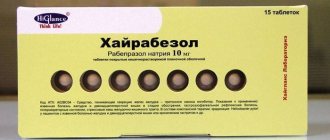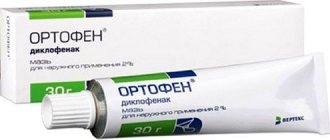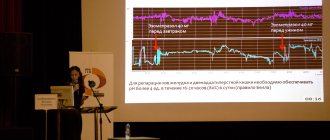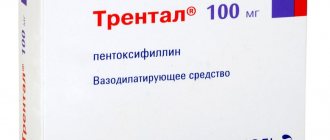Composition per 1 tablet:
Active substance:
Pancreatin - 100 mg The amount of pancreatin is indicated for a substance with an amylolytic activity of at least 1700 FIP units; lipolytic activity of at least 3000 FIP units; total proteolytic activity of at least 130 FIP units.
Excipients:
calcium stearate - 3.2 mg, potato starch - 7.4 mg, croscarmellose sodium - 1.2 mg, lactose monohydrate - to obtain an uncoated tablet weighing 320 mg
Excipients of the coating to obtain a tablet with a coating weighing 335 mg: titanium dioxide - 0.933 mg, azorubine dye (acid red dye 2C) - 0.025 mg, methacrylic acid and ethyl acrylate copolymer (1:1) - 6.948 mg, macrogol 4000 - 1.044 mg, talc - 4.184 mg, povidone - 1.866 mg.
Composition of the drug
The instructions for use describe “Pancreatin 25 IU” as a very effective drug, which includes the following components: active substance - pancreatin, gelatin, milk sugar, calcium stearate, titanium dioxide, petroleum jelly, azorubine dye, potato starch, cellacephate and polysorbate.
Many patients ask the question: what does the abbreviation ED stand for? It actually stands for a unit of action.
Description:
Tablets coated with a pink or dark pink color interspersed with a specific odor, biconvex in shape, two layers visible on the cross section.
Pharmacotherapeutic group:
digestive enzyme agent.
ATX code
: A09AA02.
Pharmaceutical action
Pancreatin compensates for the insufficiency of the exocrine function of the pancreas and has proteolytic, amylolytic and lipolytic effects.
The enzymes included in pancreatin (lipase, alpha-amylase, trypsin, chymotrypsin) help break down proteins into amino acids, fats into glycerol and fatty acids, starch into dextrins and monosaccharides.
Improves the functional state of the gastrointestinal tract, normalizes digestion processes.
Trypsin inhibits stimulated pancreatic secretion and has an analgesic effect.
Pancreatic enzymes are released from the dosage form in the alkaline environment of the small intestine, since they are protected from the action of gastric juice by the membrane.
The maximum enzymatic activity of the drug is observed 30-45 minutes after oral administration.
Directions for use and doses
- The dose (in terms of lipase) depends on age and the degree of pancreatic insufficiency. The average dose for adults is 150,000 units/day. In case of complete insufficiency of exocrine pancreatic function - 400,000 units/day, which corresponds to the daily requirement of an adult for lipase. The maximum daily dose is 15,000 units/kg.
- Children under 1.5 years old - 50,000 units/day; over 1.5 years - 100,000 units/day. The duration of treatment can vary from several days (if the digestive process is disrupted due to errors in the diet) to several months and even years (if constant replacement therapy is necessary).
Indications for use
Replacement therapy for exocrine pancreatic insufficiency: chronic pancreatitis, pancreatectomy, condition after irradiation, dyspepsia, Roemheld syndrome (gastrocardiac syndrome), cystic fibrosis; flatulence, diarrhea of non-infectious origin.
Impaired digestion of food (condition after resection of the stomach and small intestine); to improve food digestion in people with normal gastrointestinal function in case of errors in nutrition (eating fatty foods, large amounts of food, irregular meals) and in cases of chewing dysfunction, sedentary lifestyle, prolonged immobilization.
Preparation for X-ray examination and ultrasound of the abdominal organs.
"Pancreatin", tablets 25 units: instructions for use
The tablets are usually taken orally with or immediately after meals. The pill should be washed down with plenty of plain water or juice. Do not chew the tablets under any circumstances; swallow them whole.
The dosage is selected individually, and only an experienced specialist can do this, depending on your case.
However, the instructions for use for adults recommend using the drug “Pancreatin 25 units” as follows: from three to six applications per day, two to four tablets. The maximum daily dose is sixteen tablets.
For children, three applications per day will be enough, using one tablet at a time.
The duration of use of this medication depends on each case. If you need to improve digestion without concomitant serious diseases, then a short course of treatment of a few days will be enough.
If your body needs constant replacement therapy, then doctors may prescribe this remedy for you for several months or even years.
It would be useful to say once again that you should not take Pancreatin 25 IU tablets without the recommendation of your doctor. Of course, they are relatively safe, but you must understand the reasons for your poor condition. After all, no one knows, maybe a more serious disease is hidden behind ordinary diarrhea.
Side effects
Allergic reactions. In some cases - diarrhea, constipation, discomfort in the stomach, nausea (the cause-and-effect relationship between the development of these reactions and the effect of pancreatin has not been established, since these phenomena refer to symptoms of exocrine pancreatic insufficiency). With prolonged use in high doses, perianal irritation and irritation of the oral mucosa may occur. Patients with cystic fibrosis may develop strictures in the ileocecal region and in the ascending colon.
Pancreatin 25 units 60 pcs. enteric-coated tablets
pharmachologic effect
Enzyme agent. Contains pancreatic enzymes - amylase, lipase and proteases, which facilitate the digestion of carbohydrates, fats and proteins, which facilitates their more complete absorption in the small intestine. In diseases of the pancreas, it compensates for the insufficiency of its exocrine function and helps improve the digestion process.
Composition and release form Pancreatin 25 units 60 pcs. enteric-coated tablets
Tablets - 1 tablet: pancreatin 25 units (100 mg).
10 pieces. - blisters (6) - cardboard packs.
60 pcs. - dark glass jars (1) - cardboard packs.
Description of the dosage form
Enteric-coated tablets.
Directions for use and doses
The dose (in terms of lipase) depends on age and the degree of pancreatic insufficiency. The average dose for adults is 150,000 units/day. In case of complete insufficiency of exocrine pancreatic function - 400,000 units/day, which corresponds to the daily requirement of an adult for lipase.
The maximum daily dose is 15,000 units/kg.
Children under 1.5 years old - 50,000 units/day; over 1.5 years - 100,000 units/day.
The duration of treatment can vary from several days (if the digestive process is disrupted due to errors in the diet) to several months and even years (if constant replacement therapy is necessary).
Pharmacokinetics
The pharmacokinetics of pancreatin have not been studied.
Indications for use Pancreatin 25 units 60 pcs. enteric-coated tablets
Insufficiency of exocrine pancreatic function (including in chronic pancreatitis, cystic fibrosis).
Chronic inflammatory-dystrophic diseases of the stomach, intestines, liver, gall bladder; conditions after resection or irradiation of these organs, accompanied by impaired digestion of food, flatulence, diarrhea (as part of combination therapy).
To improve the digestion of food in patients with normal gastrointestinal function in case of errors in nutrition, as well as in cases of impaired chewing function, forced long-term immobilization, and a sedentary lifestyle.
Preparation for x-ray and ultrasound examination of the abdominal organs.
Contraindications
Acute pancreatitis. Hypersensitivity to pancreatin.
Application Pancreatin 25 units 60 pcs. Enteric-coated tablets during pregnancy and breastfeeding
The safety of using pancreatin during pregnancy has not been sufficiently studied. Use is possible in cases where the expected benefit to the mother outweighs the potential risk to the fetus.
Experimental studies have shown that pancreatin does not have a teratogenic effect.
Use in children
Application is possible according to the dosage regimen. With high lipase activity contained in pancreatin, the likelihood of developing constipation in children increases.
special instructions
Use in the acute phase of chronic pancreatitis is not recommended.
For cystic fibrosis, the dose should be adequate to the amount of enzymes that is necessary for the absorption of fats, taking into account the quality and quantity of food consumed.
For cystic fibrosis, the use of pancreatin in doses of more than 10,000 units/kg/day (in terms of lipase) is not recommended due to the increased risk of developing strictures (fibrous colonopathy) in the ileocecal region and in the ascending colon.
With high lipase activity contained in pancreatin, the likelihood of developing constipation in children increases. Increasing the dose of pancreatin in this category of patients should be carried out gradually.
Digestive system disorders may occur in patients with hypersensitivity to pancreatin, or in patients with meconium ileus or a history of intestinal resection.
Side effects Pancreatin 25 units 60 pcs. enteric-coated tablets
When used in average therapeutic doses, side effects are observed in less than 1%.
From the digestive system: in some cases - diarrhea, constipation, discomfort in the stomach, nausea. The cause-and-effect relationship between the development of these reactions and the action of pancreatin has not been established, because These phenomena refer to symptoms of exocrine pancreatic insufficiency.
Allergic reactions: in some cases - skin manifestations.
From the metabolic side: with long-term use in high doses, the development of hyperuricosuria is possible; in excessively high doses, an increase in the level of uric acid in the blood plasma.
Other: when using pancreatin in high doses in children, perianal irritation may occur.
Drug interactions
When used simultaneously with antacids containing calcium carbonate and/or magnesium hydroxide, the effectiveness of pancreatin may be reduced.
With simultaneous use, it is theoretically possible to reduce the clinical effectiveness of acarbose.
With simultaneous use of iron supplements, a decrease in iron absorption is possible.
special instructions
The safety of using pancreatin during pregnancy has not been sufficiently studied. Use is possible in cases where the expected benefit to the mother outweighs the potential risk to the fetus.
In cystic fibrosis, the use of pancreatin in high doses is not recommended due to the increased risk of strictures (fibrotic colonopathy). The dose should be adequate to the amount of enzymes necessary for the absorption of fats, taking into account the quality and quantity of food consumed.
With long-term use, iron supplements are prescribed simultaneously.
Contraindications
Hypersensitivity to the components of the drug, acute pancreatitis, exacerbation of chronic pancreatitis, children under 6 years of age.
The drug contains lactose monohydrate, therefore its use is not recommended for patients with rare hereditary diseases associated with galactose intolerance, lactase deficiency or glucose-galactose malabsorption syndrome.
Carefully
In case of cystic fibrosis, the drug should be prescribed with caution, because the dose should be adequate to the quantity and quality of food consumed; the use of pancreatin in high doses is not recommended due to the increased risk of developing strictures (fibrous colonopathy).
Criteria for an adequately selected dose: increase in body weight, normalization of stool (less than 3 times a day, normalization of consistency), reduction of bloating.
Use during pregnancy and breastfeeding
The safety of using pancreatin during pregnancy has not been sufficiently studied. Use is possible in cases where the expected benefit to the mother outweighs the potential risk to the fetus.
During lactation, the use of pancreatin is not contraindicated.
Important instructions
The drug "Pancreatin 25 units" (instructions for use, analogues are listed in this article) cannot be taken in large doses by patients suffering from cystic fibrosis. In this case, there is a high probability of stricture formation.
To determine the correct dosage, you need to take into account the amount of enzymes needed to absorb fats, as well as the quantity and quality of all food consumed. During treatment, it is recommended to follow a diet.
Please note that the drug “Pancreatin 25 units” can reduce the content of iron and folic acid in the body.








